Unit 6 第一课时 Section A(1a-2d)课件【大单元教学】人教版七年级英语上册Unit 6 Do you like bananas
文档属性
| 名称 | Unit 6 第一课时 Section A(1a-2d)课件【大单元教学】人教版七年级英语上册Unit 6 Do you like bananas |  | |
| 格式 | pptx | ||
| 文件大小 | 45.5MB | ||
| 资源类型 | 试卷 | ||
| 版本资源 | 人教新目标(Go for it)版 | ||
| 科目 | 英语 | ||
| 更新时间 | 2023-09-21 13:35:42 | ||
图片预览

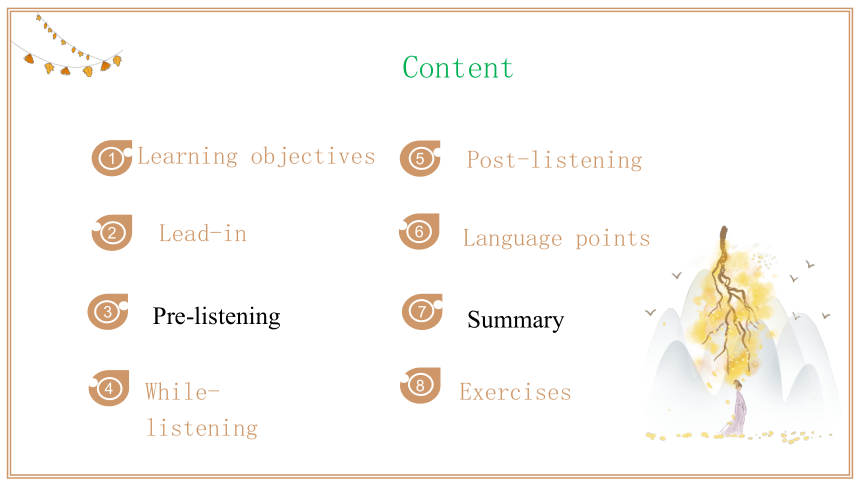
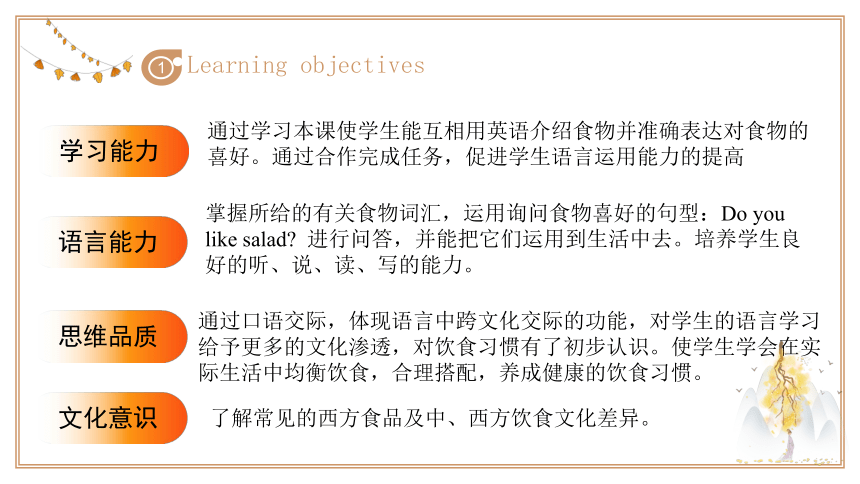
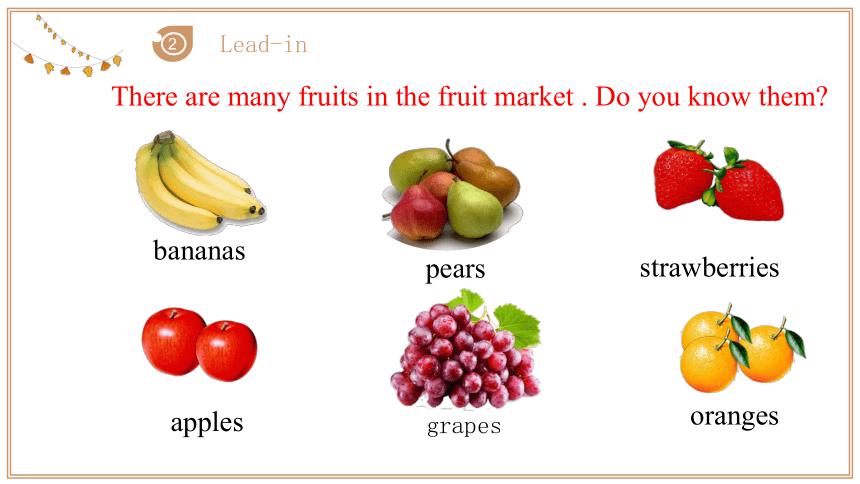
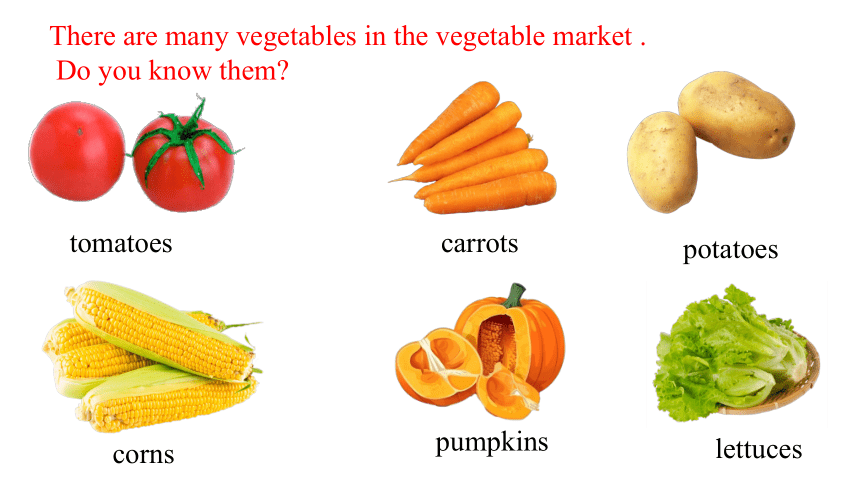
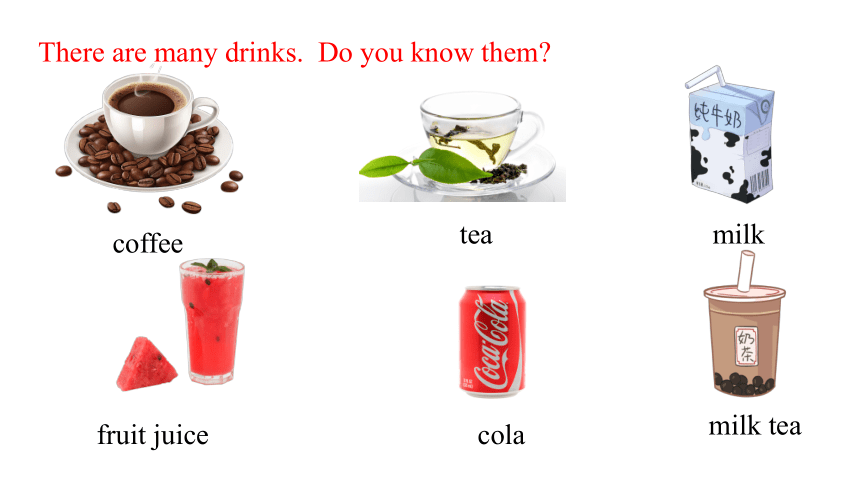
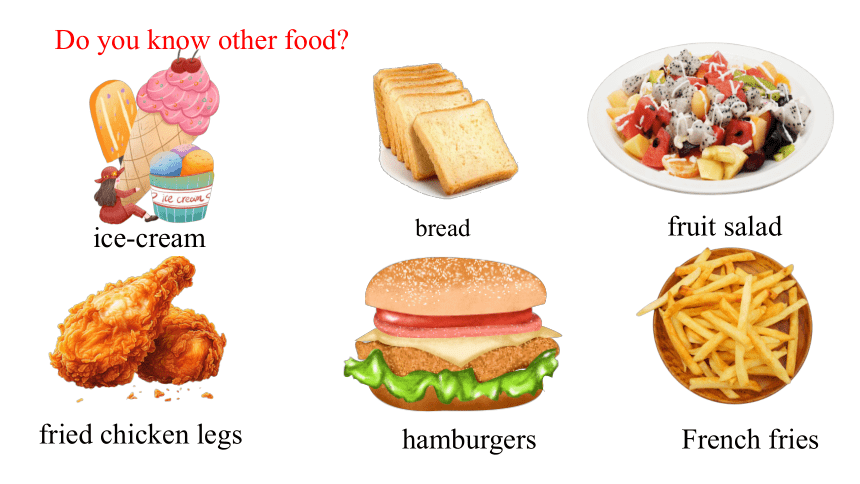
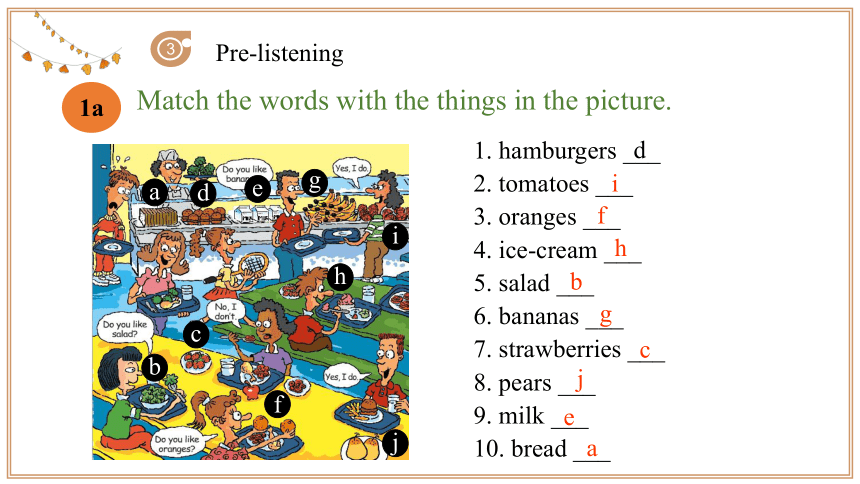
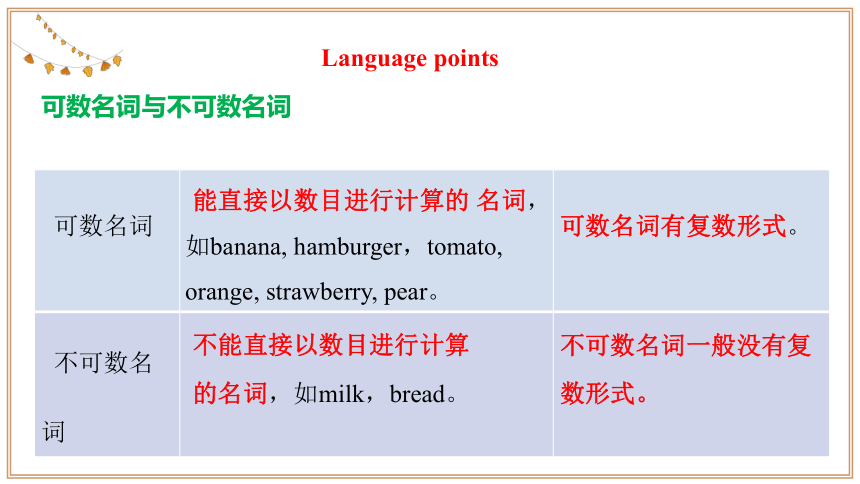
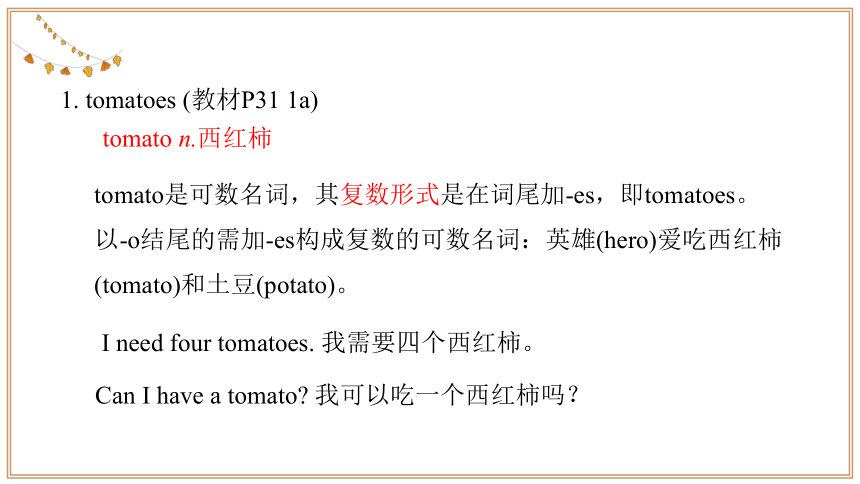
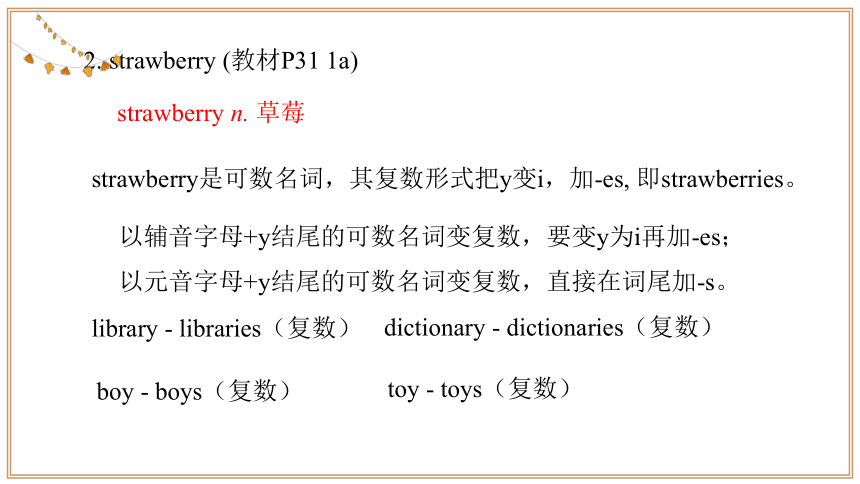
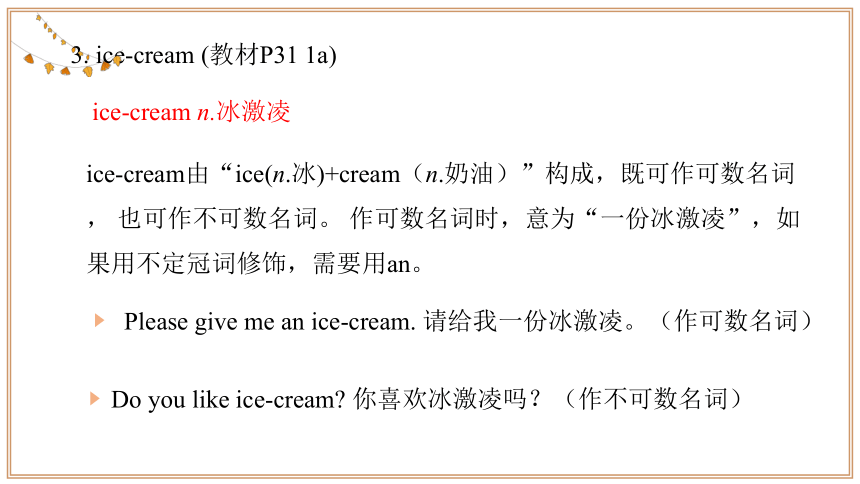
文档简介
(共46张PPT)
人教版 英语(七年级下)
Unit 6
Do you like bananas
Section A(1a-2d)
Lead-in
1
2
Pre-listening
3
While-listening
4
Content
Post-listening
5
Language points
6
Summary
7
Exercises
8
Learning objectives
了解常见的西方食品及中、西方饮食文化差异。
文化意识
语言能力
思维品质
学习能力
通过口语交际,体现语言中跨文化交际的功能,对学生的语言学习给予更多的文化渗透,对饮食习惯有了初步认识。使学生学会在实际生活中均衡饮食,合理搭配,养成健康的饮食习惯。
1
Learning objectives
掌握所给的有关食物词汇,运用询问食物喜好的句型:Do you like salad 进行问答,并能把它们运用到生活中去。培养学生良好的听、说、读、写的能力。
通过学习本课使学生能互相用英语介绍食物并准确表达对食物的喜好。通过合作完成任务,促进学生语言运用能力的提高
There are many fruits in the fruit market . Do you know them
bananas
pears
strawberries
apples
oranges
Lead-in
2
grapes
tomatoes
There are many vegetables in the vegetable market .
Do you know them
carrots
potatoes
corns
pumpkins
lettuces
cola
There are many drinks. Do you know them
coffee
tea
milk
fruit juice
milk tea
Do you know other food
ice-cream
fruit salad
fried chicken legs
hamburgers
French fries
bread
1a
Match the words with the things in the picture.
1. hamburgers ___
2. tomatoes ___
3. oranges ___
4. ice-cream ___
5. salad ___
6. bananas ___
7. strawberries ___
8. pears ___
9. milk ___
10. bread ___
d
i
f
h
b
g
c
j
e
a
a
b
c
d
e
f
g
h
i
j
Pre-listening
3
可数名词与不可数名词
可数名词 能直接以数目进行计算的 名词,如banana, hamburger,tomato, orange, strawberry, pear。 可数名词有复数形式。
不可数名词 不能直接以数目进行计算 的名词,如milk,bread。 不可数名词一般没有复数形式。
Language points
1. tomatoes (教材P31 1a)
tomato是可数名词,其复数形式是在词尾加-es,即tomatoes。
以-o结尾的需加-es构成复数的可数名词:英雄(hero)爱吃西红柿(tomato)和土豆(potato)。
I need four tomatoes. 我需要四个西红柿。
tomato n.西红柿
Can I have a tomato 我可以吃一个西红柿吗?
2. strawberry (教材P31 1a)
strawberry是可数名词,其复数形式把y变i,加-es, 即strawberries。
library - libraries(复数)
strawberry n. 草莓
boy - boys(复数)
dictionary - dictionaries(复数)
toy - toys(复数)
以辅音字母+y结尾的可数名词变复数,要变y为i再加-es;
以元音字母+y结尾的可数名词变复数,直接在词尾加-s。
3. ice-cream (教材P31 1a)
ice-cream由“ice(n.冰)+cream(n.奶油)”构成,既可作可数名词, 也可作不可数名词。 作可数名词时,意为“一份冰激凌”,如果用不定冠词修饰,需要用an。
Please give me an ice-cream. 请给我一份冰激凌。(作可数名词)
ice-cream n.冰激凌
Do you like ice-cream 你喜欢冰激凌吗?(作不可数名词)
4. salad (教材P31 1a)
salad作名词, 是音译词。泛指沙拉这种食物时,是不可数名词;特指沙拉作为一份食物时,是可数名词。蔬菜沙拉:vegetable salad;水果沙拉:fruit salad。
salad n.沙拉
Do you like fruit salad 你喜欢水果沙拉吗?
5. milk (教材P31 1a)
milk作不可数名词,可以借助单位词来表达它的数量。
a glass of milk 一杯牛奶
milk n. 牛奶
two glasses of milk 两杯牛奶
6. bread (教材P31 1a)
bread是不可数名词,不可与不定冠词a或具体的数词连用。 如果需要表达面包的数量,则用piece/ slice(片)来修饰。
bread n. 面包
a piece/slice of bread 一片面包
five pieces/slices of bread 五片面包
可数名词复数形式:
bananas
pears
strawberries
apples
tomatoes
hamburgers
oranges
vegetables
不可数名词:
bread
milk
ice-cream
salad
既是可数名词也是不可数名词:
Quick eyes
—What are these —They’re...
Do you like…
Play a game
Quick eyes
—What’s this —It’s a ...
Do you like it
Quick eyes
—What’s this —It’s...
Do you like…
Read the dialogue in the picture.
—Do you like bananas
—Yes, I do.
—Do you like salad
—No, I don’t.
—Do you like oranges
—Yes, I do.
关键词是有关食物的名词。
1b
Listen and number the conversations [1-3].
A: Do you like salad
B: No, I don’t.
A: Do you like bananas
B: Yes, I do.
A: Do you like oranges
B: Yes, I do.
2
3
1
—Do you like…
—Yes, I do./No, I don’t.
While-listening
4
Practice the conversations with your partner. Then make your own conversations.
1c
A: Do you like salad
B: No, I don’t.
A: Do you like bananas
B: Yes, I do.
A: Do you like oranges
B: Yes, I do.
2
1
3
Post-listening
5
Listen and circle the food you hear.
2a
hamburgers pears tomatoes strawberries
oranges ice-cream salad bananas
While-listening
4
I like hamburgers.
Do you like
__________
Yes, I do.
Listen again. Fill in the blanks.
2b
hamburgers
Do you like ________
No, I don't like ________.
tomatoes
tomatoes
Oh, no.
Let's have _________.
No
I don't like _________.
ice-cream
ice-cream
Listen again. Answer the questions.
2b
Does the boy like hamburgers
Does the boy like tomatoes
Does the boy like ice-cream
Yes, he does.
Yes, she does.
No, he doesn’t.
No, he doesn’t.
Does the girl like hamburgers
A: Does he/ she like…
B: Yes, he/she does.
No, he/she doesn’t.
Read the conversations in pairs.
1. Girl: I like hamburgers. Do you like hamburgers
Boy: Yes, I do.
2. Girl: Do you like tomatoes
Boy: No, I don't like tomatoes.
3. Girl: Let's have ice-cream.
Boy: Oh, no.
Girl: No
Boy: I don't like ice-cream.
Practice the conversations in 2b. Give answers that are true for you. Do a survey in groups of four and give a report.
2c
I like tomatoes. Do you like tomatoes
Yes, I do.
No, I don’t.
Do you like ice-cream
如果喜欢就打√,不喜欢就打×。
Practice the conversations in 2b. Give answers that are true for you. Do a survey in groups of four and give a report.
2c
Name hamburgers tomatoes oranges ice-cream bananas milk
Report structures: I like… I don’t like… He/ She likes… He/ She doesn’t like… We/ They like… We/ They don’t like…
I know a boy. His name is John. John’s birthday is next week. So his friends are preparing for his birthday dinner. But they don’t want John to know it.
birthday n.生日
dinner n.(中午或晚上吃的)正餐
Jack: Hey, John’s birthday dinner is next week.
Let’s think about the food.
Tom: Sure. How about burgers, vegetable salad, and some fruit
Bill: Sounds good. John likes hamburgers.
Jack: Oh, I don’t like salad.
Bill: But John likes salad, and it’s his birthday.
Jack: Yes, you’re right. What about the fruit
Tom: I think John likes strawberries and apples.
Bill: OK. Let’s have strawberries and apples then.
Read and answer the question.
2d
What do they want to eat
Read the conversation carefully.
2d
Jack: Hey, John’s birthday dinner is next week.
Let’s think about the food.
Tom: Sure. How about burgers, vegetable salad, and some fruit
Bill: Sounds good. John likes hamburgers.
Jack: Oh, I don’t like salad.
Bill: But John likes salad, and it’s his birthday.
Jack: Yes, you’re right. What about the fruit
Tom: I think John likes strawberries and apples.
Bill: OK. Let’s have strawberries and apples then.
下周。 该短语前不加介词。
思考;思索。about是介词,后接名词、代词或v-ing形式作宾语
当然(可以)
How about… ……怎么样?
burger 汉堡包 可数名词
vegetable蔬菜 可数名词
水果 表示水果总称时不可数
是的, 你说得对。
have v.吃
then adv.那么
Jack: Hey, John’s birthday dinner is next week.
Let’s think about the food.
Tom: Sure. How about burgers, vegetable salad, and some fruit
Bill: Sounds good. John likes hamburgers.
Jack: Oh, I don’t like salad.
Bill: But John likes salad, and it’s his birthday.
Jack: Yes, you’re right. What about the fruit
Tom: I think John likes strawberries and apples.
Bill: OK. Let’s have strawberries and apples then.
Find the sentences about likes and dislikes.
2d
一般现在时第三人称单数的陈述句:主语+likes+其他.
Role-play the conversation.
2d
Jack: Hey, John’s birthday dinner is next week.
Let’s think about the food.
Tom: Sure. How about burgers, vegetable salad, and some fruit
Bill: Sounds good. John likes hamburgers.
Jack: Oh, I don’t like salad.
Bill: But John likes salad, and it’s his birthday.
Jack: Yes, you’re right. What about the fruit
Tom: I think John likes strawberries and apples.
Bill: OK. Let’s have strawberries and apples then.
Language points
How about burgers, vegetable salad, and some fruit
(教材P32 2d)
1) “How about... ”用于提出请求或建议,也可用于征求对方的意见或看法,相当于“What about... ”。其中about是介词,后接名词、代词或v-ing形式。
How about... ……怎么样?
2) 常用于提建议的句型还有:
Let’s... 我们……吧。
Why not... 为什么不……呢?
Why don’t you... 你为什么不……呢?
Would you like... 你想……吗?
Let’s ask Mary for help. 我们向玛丽求助吧。
Why not ask her 为什么不问问她呢?
Why don’t you buy some flowers 你为什么不买些花呢?
Would you like a pear 你想吃个梨吗?
2. Yes, you’re right. (教材P32 2d)
right作形容词在句中作表语或定语。其反义词为wrong“错误的”。
right adj.正确的;适当的
Is he right or wrong 他是对的还是错的?
He is the right man for the job. 他是这份工作的合适人选。
【拓展延伸】:
1) right作形容词,还可意为“右边的”。其对应词为left “左边的”。
2) right还可作名词, 意为“右边;右方”。on the right意为“在右边”。
3) right还可作副词, 意为“恰好;正好”。
3.John’s birthday dinner is next week. (教材P32 2d)
next week 意为“下周”,英语中的 next, last 后跟表示时间的词语构成时间状语,如:
next day 第二天 last month 上个月
next month 下个月 last week 上周
next year 明年 last year 去年
4. Let’s think about the food. (教材P32 2d)
让我们来想想(吃什么)食物吧。
think about表示“思考;考虑”, think 为不及物动词, 常与介词 about连用。
e.g: Let me think about your house. 让我考虑考虑你的房子问题。
5. Let’s have strawberries and apples then. (教材P32 2d)
Let’s have…意为“让我们吃……”
1) 在英语中“have+表示一日三餐”的名词,意为“用餐”。
have breakfast/lunch/supper 吃早饭/午饭/晚饭
have dinner 吃晚饭
2)“have+表示食品、饮料等的名词”意为“吃;喝”
(=eat, drink)。如:
have (some) bread 吃面包
have eggs (for breakfast) (早餐)吃鸡蛋
have (a cup of ) tea 喝(一杯)茶
1. We have learnt to talk about likes and dislikes:
2. We have known the different forms of countable nouns and
uncountable nouns
3. We have learnt some key words and useful expressions
Summary
7
Exercises
8
根据句意、首字母、或汉语提示写出所缺的单词
1. Judy doesn’t like (草莓).
2.What do you have for (正餐)
3.We like (蔬菜) for lunch.
4.—Do you like (沙拉)
5.My mother wants me to drink (牛奶) every day.
6.Newton(牛顿) was playing under a tree when an a fell onto his head.
7.Today is my b . I′m nine years old. Mom and Dad get a big cake for me.
pple
strawberry
dinner
vegetables
salad
milk
irthday
二、根据汉语完成句子。
1.你喜欢汉堡包吗
you
2.他有一些草莓。
He some .
3.他不喜欢沙拉。
He salad.
4.这儿有一些西红柿。你喜欢它们吗
Here some . you like
5.她每天吃一个橙子。
She has every day.
Do like hamburgers
has strawberries
doesn’t like
are tomatoes Do them
an orange
A. Yes, I like it a lot.
B. What do we have
C. Do you like milk
D. I don’ t like pears.
E. Do you like hamburgers, too
F. I like eggs and bananas.
G. What about you
A: What do you like for breakfast, Linda
B: 1. ____________
A: 2. ____________
B: No, I don’ t. My brother Bill likes it.
A: Do you like chicken
B: 3. And I like chicken, rice and apples for lunch. 4.___________
A: I like hamburgers and oranges for lunch. 5._______________
B: No, I don’ t. I like bread. And I often have tomatoes and bread for dinner.
A: Oh, I like carrots and ice-cream for dinner.
【答案】 FCAGE
三、补全对话
Thank you!
人教版 英语(七年级下)
Unit 6
Do you like bananas
Section A(1a-2d)
Lead-in
1
2
Pre-listening
3
While-listening
4
Content
Post-listening
5
Language points
6
Summary
7
Exercises
8
Learning objectives
了解常见的西方食品及中、西方饮食文化差异。
文化意识
语言能力
思维品质
学习能力
通过口语交际,体现语言中跨文化交际的功能,对学生的语言学习给予更多的文化渗透,对饮食习惯有了初步认识。使学生学会在实际生活中均衡饮食,合理搭配,养成健康的饮食习惯。
1
Learning objectives
掌握所给的有关食物词汇,运用询问食物喜好的句型:Do you like salad 进行问答,并能把它们运用到生活中去。培养学生良好的听、说、读、写的能力。
通过学习本课使学生能互相用英语介绍食物并准确表达对食物的喜好。通过合作完成任务,促进学生语言运用能力的提高
There are many fruits in the fruit market . Do you know them
bananas
pears
strawberries
apples
oranges
Lead-in
2
grapes
tomatoes
There are many vegetables in the vegetable market .
Do you know them
carrots
potatoes
corns
pumpkins
lettuces
cola
There are many drinks. Do you know them
coffee
tea
milk
fruit juice
milk tea
Do you know other food
ice-cream
fruit salad
fried chicken legs
hamburgers
French fries
bread
1a
Match the words with the things in the picture.
1. hamburgers ___
2. tomatoes ___
3. oranges ___
4. ice-cream ___
5. salad ___
6. bananas ___
7. strawberries ___
8. pears ___
9. milk ___
10. bread ___
d
i
f
h
b
g
c
j
e
a
a
b
c
d
e
f
g
h
i
j
Pre-listening
3
可数名词与不可数名词
可数名词 能直接以数目进行计算的 名词,如banana, hamburger,tomato, orange, strawberry, pear。 可数名词有复数形式。
不可数名词 不能直接以数目进行计算 的名词,如milk,bread。 不可数名词一般没有复数形式。
Language points
1. tomatoes (教材P31 1a)
tomato是可数名词,其复数形式是在词尾加-es,即tomatoes。
以-o结尾的需加-es构成复数的可数名词:英雄(hero)爱吃西红柿(tomato)和土豆(potato)。
I need four tomatoes. 我需要四个西红柿。
tomato n.西红柿
Can I have a tomato 我可以吃一个西红柿吗?
2. strawberry (教材P31 1a)
strawberry是可数名词,其复数形式把y变i,加-es, 即strawberries。
library - libraries(复数)
strawberry n. 草莓
boy - boys(复数)
dictionary - dictionaries(复数)
toy - toys(复数)
以辅音字母+y结尾的可数名词变复数,要变y为i再加-es;
以元音字母+y结尾的可数名词变复数,直接在词尾加-s。
3. ice-cream (教材P31 1a)
ice-cream由“ice(n.冰)+cream(n.奶油)”构成,既可作可数名词, 也可作不可数名词。 作可数名词时,意为“一份冰激凌”,如果用不定冠词修饰,需要用an。
Please give me an ice-cream. 请给我一份冰激凌。(作可数名词)
ice-cream n.冰激凌
Do you like ice-cream 你喜欢冰激凌吗?(作不可数名词)
4. salad (教材P31 1a)
salad作名词, 是音译词。泛指沙拉这种食物时,是不可数名词;特指沙拉作为一份食物时,是可数名词。蔬菜沙拉:vegetable salad;水果沙拉:fruit salad。
salad n.沙拉
Do you like fruit salad 你喜欢水果沙拉吗?
5. milk (教材P31 1a)
milk作不可数名词,可以借助单位词来表达它的数量。
a glass of milk 一杯牛奶
milk n. 牛奶
two glasses of milk 两杯牛奶
6. bread (教材P31 1a)
bread是不可数名词,不可与不定冠词a或具体的数词连用。 如果需要表达面包的数量,则用piece/ slice(片)来修饰。
bread n. 面包
a piece/slice of bread 一片面包
five pieces/slices of bread 五片面包
可数名词复数形式:
bananas
pears
strawberries
apples
tomatoes
hamburgers
oranges
vegetables
不可数名词:
bread
milk
ice-cream
salad
既是可数名词也是不可数名词:
Quick eyes
—What are these —They’re...
Do you like…
Play a game
Quick eyes
—What’s this —It’s a ...
Do you like it
Quick eyes
—What’s this —It’s...
Do you like…
Read the dialogue in the picture.
—Do you like bananas
—Yes, I do.
—Do you like salad
—No, I don’t.
—Do you like oranges
—Yes, I do.
关键词是有关食物的名词。
1b
Listen and number the conversations [1-3].
A: Do you like salad
B: No, I don’t.
A: Do you like bananas
B: Yes, I do.
A: Do you like oranges
B: Yes, I do.
2
3
1
—Do you like…
—Yes, I do./No, I don’t.
While-listening
4
Practice the conversations with your partner. Then make your own conversations.
1c
A: Do you like salad
B: No, I don’t.
A: Do you like bananas
B: Yes, I do.
A: Do you like oranges
B: Yes, I do.
2
1
3
Post-listening
5
Listen and circle the food you hear.
2a
hamburgers pears tomatoes strawberries
oranges ice-cream salad bananas
While-listening
4
I like hamburgers.
Do you like
__________
Yes, I do.
Listen again. Fill in the blanks.
2b
hamburgers
Do you like ________
No, I don't like ________.
tomatoes
tomatoes
Oh, no.
Let's have _________.
No
I don't like _________.
ice-cream
ice-cream
Listen again. Answer the questions.
2b
Does the boy like hamburgers
Does the boy like tomatoes
Does the boy like ice-cream
Yes, he does.
Yes, she does.
No, he doesn’t.
No, he doesn’t.
Does the girl like hamburgers
A: Does he/ she like…
B: Yes, he/she does.
No, he/she doesn’t.
Read the conversations in pairs.
1. Girl: I like hamburgers. Do you like hamburgers
Boy: Yes, I do.
2. Girl: Do you like tomatoes
Boy: No, I don't like tomatoes.
3. Girl: Let's have ice-cream.
Boy: Oh, no.
Girl: No
Boy: I don't like ice-cream.
Practice the conversations in 2b. Give answers that are true for you. Do a survey in groups of four and give a report.
2c
I like tomatoes. Do you like tomatoes
Yes, I do.
No, I don’t.
Do you like ice-cream
如果喜欢就打√,不喜欢就打×。
Practice the conversations in 2b. Give answers that are true for you. Do a survey in groups of four and give a report.
2c
Name hamburgers tomatoes oranges ice-cream bananas milk
Report structures: I like… I don’t like… He/ She likes… He/ She doesn’t like… We/ They like… We/ They don’t like…
I know a boy. His name is John. John’s birthday is next week. So his friends are preparing for his birthday dinner. But they don’t want John to know it.
birthday n.生日
dinner n.(中午或晚上吃的)正餐
Jack: Hey, John’s birthday dinner is next week.
Let’s think about the food.
Tom: Sure. How about burgers, vegetable salad, and some fruit
Bill: Sounds good. John likes hamburgers.
Jack: Oh, I don’t like salad.
Bill: But John likes salad, and it’s his birthday.
Jack: Yes, you’re right. What about the fruit
Tom: I think John likes strawberries and apples.
Bill: OK. Let’s have strawberries and apples then.
Read and answer the question.
2d
What do they want to eat
Read the conversation carefully.
2d
Jack: Hey, John’s birthday dinner is next week.
Let’s think about the food.
Tom: Sure. How about burgers, vegetable salad, and some fruit
Bill: Sounds good. John likes hamburgers.
Jack: Oh, I don’t like salad.
Bill: But John likes salad, and it’s his birthday.
Jack: Yes, you’re right. What about the fruit
Tom: I think John likes strawberries and apples.
Bill: OK. Let’s have strawberries and apples then.
下周。 该短语前不加介词。
思考;思索。about是介词,后接名词、代词或v-ing形式作宾语
当然(可以)
How about… ……怎么样?
burger 汉堡包 可数名词
vegetable蔬菜 可数名词
水果 表示水果总称时不可数
是的, 你说得对。
have v.吃
then adv.那么
Jack: Hey, John’s birthday dinner is next week.
Let’s think about the food.
Tom: Sure. How about burgers, vegetable salad, and some fruit
Bill: Sounds good. John likes hamburgers.
Jack: Oh, I don’t like salad.
Bill: But John likes salad, and it’s his birthday.
Jack: Yes, you’re right. What about the fruit
Tom: I think John likes strawberries and apples.
Bill: OK. Let’s have strawberries and apples then.
Find the sentences about likes and dislikes.
2d
一般现在时第三人称单数的陈述句:主语+likes+其他.
Role-play the conversation.
2d
Jack: Hey, John’s birthday dinner is next week.
Let’s think about the food.
Tom: Sure. How about burgers, vegetable salad, and some fruit
Bill: Sounds good. John likes hamburgers.
Jack: Oh, I don’t like salad.
Bill: But John likes salad, and it’s his birthday.
Jack: Yes, you’re right. What about the fruit
Tom: I think John likes strawberries and apples.
Bill: OK. Let’s have strawberries and apples then.
Language points
How about burgers, vegetable salad, and some fruit
(教材P32 2d)
1) “How about... ”用于提出请求或建议,也可用于征求对方的意见或看法,相当于“What about... ”。其中about是介词,后接名词、代词或v-ing形式。
How about... ……怎么样?
2) 常用于提建议的句型还有:
Let’s... 我们……吧。
Why not... 为什么不……呢?
Why don’t you... 你为什么不……呢?
Would you like... 你想……吗?
Let’s ask Mary for help. 我们向玛丽求助吧。
Why not ask her 为什么不问问她呢?
Why don’t you buy some flowers 你为什么不买些花呢?
Would you like a pear 你想吃个梨吗?
2. Yes, you’re right. (教材P32 2d)
right作形容词在句中作表语或定语。其反义词为wrong“错误的”。
right adj.正确的;适当的
Is he right or wrong 他是对的还是错的?
He is the right man for the job. 他是这份工作的合适人选。
【拓展延伸】:
1) right作形容词,还可意为“右边的”。其对应词为left “左边的”。
2) right还可作名词, 意为“右边;右方”。on the right意为“在右边”。
3) right还可作副词, 意为“恰好;正好”。
3.John’s birthday dinner is next week. (教材P32 2d)
next week 意为“下周”,英语中的 next, last 后跟表示时间的词语构成时间状语,如:
next day 第二天 last month 上个月
next month 下个月 last week 上周
next year 明年 last year 去年
4. Let’s think about the food. (教材P32 2d)
让我们来想想(吃什么)食物吧。
think about表示“思考;考虑”, think 为不及物动词, 常与介词 about连用。
e.g: Let me think about your house. 让我考虑考虑你的房子问题。
5. Let’s have strawberries and apples then. (教材P32 2d)
Let’s have…意为“让我们吃……”
1) 在英语中“have+表示一日三餐”的名词,意为“用餐”。
have breakfast/lunch/supper 吃早饭/午饭/晚饭
have dinner 吃晚饭
2)“have+表示食品、饮料等的名词”意为“吃;喝”
(=eat, drink)。如:
have (some) bread 吃面包
have eggs (for breakfast) (早餐)吃鸡蛋
have (a cup of ) tea 喝(一杯)茶
1. We have learnt to talk about likes and dislikes:
2. We have known the different forms of countable nouns and
uncountable nouns
3. We have learnt some key words and useful expressions
Summary
7
Exercises
8
根据句意、首字母、或汉语提示写出所缺的单词
1. Judy doesn’t like (草莓).
2.What do you have for (正餐)
3.We like (蔬菜) for lunch.
4.—Do you like (沙拉)
5.My mother wants me to drink (牛奶) every day.
6.Newton(牛顿) was playing under a tree when an a fell onto his head.
7.Today is my b . I′m nine years old. Mom and Dad get a big cake for me.
pple
strawberry
dinner
vegetables
salad
milk
irthday
二、根据汉语完成句子。
1.你喜欢汉堡包吗
you
2.他有一些草莓。
He some .
3.他不喜欢沙拉。
He salad.
4.这儿有一些西红柿。你喜欢它们吗
Here some . you like
5.她每天吃一个橙子。
She has every day.
Do like hamburgers
has strawberries
doesn’t like
are tomatoes Do them
an orange
A. Yes, I like it a lot.
B. What do we have
C. Do you like milk
D. I don’ t like pears.
E. Do you like hamburgers, too
F. I like eggs and bananas.
G. What about you
A: What do you like for breakfast, Linda
B: 1. ____________
A: 2. ____________
B: No, I don’ t. My brother Bill likes it.
A: Do you like chicken
B: 3. And I like chicken, rice and apples for lunch. 4.___________
A: I like hamburgers and oranges for lunch. 5._______________
B: No, I don’ t. I like bread. And I often have tomatoes and bread for dinner.
A: Oh, I like carrots and ice-cream for dinner.
【答案】 FCAGE
三、补全对话
Thank you!
同课章节目录
- starters 预备篇(2012秋审查)
- Unit 1 Good morning !
- Unit 2 What’s this in English?
- Unit 3 What color is it ?
- Unit 1 My name's Gina.
- Section A
- Section B
- Unit 2 This is my sister.
- Section A
- Section B
- Unit 3 Is this your pencil?
- Section A
- Section B
- Unit 4 Where's my schoolbag?
- Section A
- Section B
- Unit 5 Do you have a soccer ball?
- Section A
- Section B
- Unit 6 Do you like bananas?
- Section A
- Section B
- Unit 7 How much are these socks?
- Section A
- Section B
- Unit 8 When is your birthday?
- Section A
- Section B
- Unit 9 My favorite subject is science.
- Section A
- Section B
